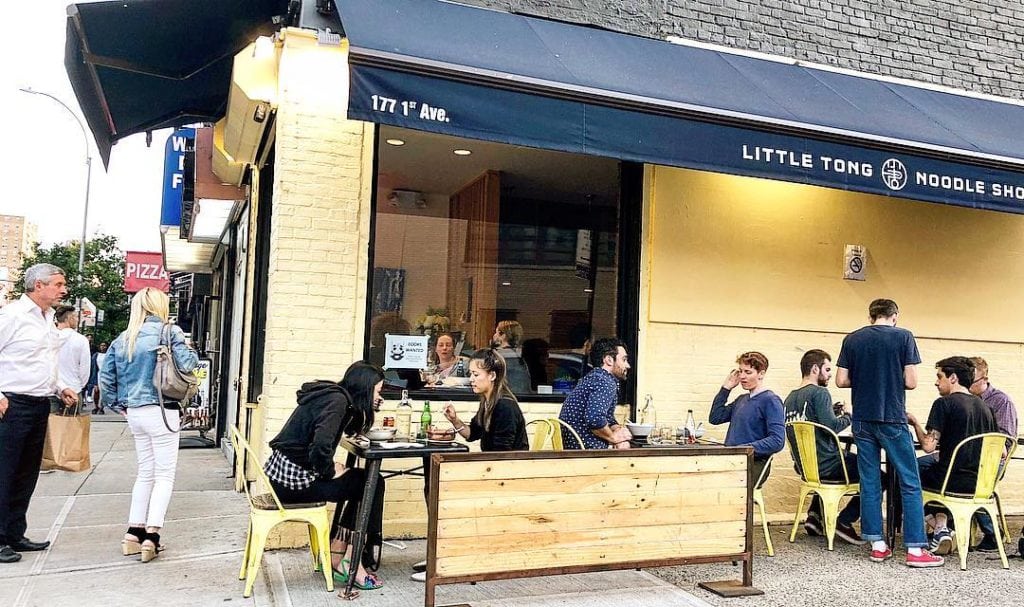Seat Me, Please? Why Restaurants Won't Seat You Without a Complete Party

Photo Caption: Counter service at Untitled, a Union Square Hospitality Group restaurant that seats incomplete parties. Christine Han
Skift Take
Restaurants: I promise I will order lots of food and drinks if you just let me sit down at my table even if the rest of my party isn't here. Also, I will come back and eat again.
It was 7 p.m. and below freezing outside when we walked into Little Tong, the super popular noodle shop in Manhattan’s East Village. I arrived with three other friends; a fourth was stuck on the subway, something that happens with increasing regularity in New York City. The restaurant was snug and warm, a relief from the cold night. And, even better, it was relatively empty. We asked for a table for five. The hostess told us we could not be seated until the fifth arrived. “We’re hungry and we’re all moms of little kids, paying babysitters by the hour. We will start to eat and drink right away,” I said, hoping she might let us sit down. The hostess was not swayed.
I pointed out that there was no bar at which to wait, just a small entryway, which was hovering somewhere around the temperature of a walk-in freezer, and which we had already filled to capacity. "Sorry, we can’t seat you." We texted our friend. "Almost there!" she wrote back. "Our friend is really close, are you sure we can’t sit down?" "I’m sure," she said. And I was sure we would be eating somewhere else that night.
Quite frankly, I’m tired of being told I can’t sit down because someone in my group is delayed. People get waylaid in traffic, delayed on the subway, or held up by an emergency at home or a crisis at work. And I’m not the only one incensed by this policy; Curb Your Enthusiasm’s Larry David feels the same way. In his most recent “Fatwa” season, he is refused a table because his party is incomplete. "We don’t seat incomplete parties," said the hostess, indignantly. "The chef really likes everyone to sit down at the same time and order together. It’s the optimal dining experience." David is baffled. "You know what the optimal dining experience is? To eat when you’re hungry." Rather than wait, he recruits a stranger having a drink at the bar to join them as a stand-in until his friend shows up. They get seated.
While I wish I’d have thought of that at Little Tong, I didn’t. I’m not as clever as Larry David. But I am someone who has worked in the restaurant business as a hostess, server, and a manager, and who has written about the industry for the past 20 years, and I wanted to get to the bottom of this policy. Why make people feel bad or scolded for being incomplete? Why not let everyone sit down and start to unwind and order drinks and snacks while waiting for that late friend, and hoist hospitality to its proper place as the most critical mission of any restaurant?

New York's Little Tong Noodle Shop, in warmer days with additional seating.
Little Tong’s restaurant manager, Emmeline Zhao, pointed out that the restaurant’s policy falls in line with common and best practices of many New York City restaurants. She’s right, it does happen all the time, but why?
Zhao explained that it comes down to numbers. "Seating incomplete parties seriously extends table turn times, even when those incomplete parties are willing to order before everyone arrives, creating a backlog of guests waiting for even longer periods of time," said Zhao.
"For a restaurant with just 28 seats, that can disappoint guests who have to wait longer than they should, and make a huge difference in our bottom line — and thus ability to pay our gratuity-free team. It can also frustrate and turn away guests whose parties are complete and ready to dine, watching a dining room full of incomplete parties occupying seats while waiting for their dining partners."
She also explained that the restaurant takes phone numbers so that incomplete parties — and complete parties who have to wait for a table because it’s full — can go to a nearby bar or coffee shop until a table is ready for them. (That option was never offered to me.)
Still, the room was nearly empty. Why enforce this policy so early in service? "From the perspective of a guest, we 100 percent understand that it can be disheartening to be standing at the door when there are empty tables in view," she said. "But we can go from empty to full in a matter of minutes, and we can't afford to have buyer's remorse from seating incomplete parties, only to be inundated with a herd of complete parties we're now unable to seat."
Gia San Angelo, the General Manager at Untitled, Union Square Hospitality’s full-service restaurant inside New York’s Whitney museum, doesn’t buy this argument. Granted she works in a large multi-unit operation, not a 28-seat restaurant in the East Village. But still, her point is well taken. "From a hospitality perspective my role is to make someone more welcoming and comfortable. If I were having a dinner party and my friend was the first to arrive would I ask someone to wait outside? I don’t think so."
Rather than reduce revenues, San Angelo said seating an incomplete party can bring up the check average. "From the business side, there’s always a chance that someone would enjoy a drink or a snack while waiting which can push the check up. But my main concern is shaping the guest experience so that they will come back and bring more friends and new friends."
Others who have run restaurants understand Zhao’s motives, but are skeptical of its long term results. “Think of a restaurant like a landlord and its tables are its apartment buildings," said Stephen Loffredo, who ran New York City restaurants Zoe, Cena, and Jovia before starting Seasoned Hospitality, a restaurant consulting business. "Every unoccupied seat is an unrented apartment."

Michael Solomonov's Zahav restaurant in Philadelphia changed its seating policy after opening.
Beatrice Stein, a restaurant consultant for the past 30 years, agrees that there can be a financial cost to seating incomplete parties. "When you seat an incomplete party, they may order drinks, but they will not begin the process of ordering until everyone is there. And the problem is you really have no way of knowing if they are on their way or at home getting dressed. It’s a balance of hospitality and revenue and you have to make that call."
Sometimes that call can go very wrong. Loffredo recalled a time when he was running the door at Zoe, which was packed at the time. One night, a woman came in ahead of the rest of her party and asked to wait at the table. Loffredo’s policy was to do his best to seat a party, even if incomplete, if that’s what they preferred. "I sat her and 45 minutes later her friend had still not shown up, and I needed that table. I had to go over and ask her to get up and go to the bar. She was not happy."
Despite the trauma of the guest who never showed up, Loffredo remains a believer in seating incomplete parties. "In particular if a restaurant is not busy, just lighten up and seat the guest and make them happy, because that guest won’t be back if they’re not treated right," he said. "I’ve been on both sides, but more often than not I have sat incomplete parties because service is paramount."
Stein said the most prudent policy when faced with an incomplete party is empowering staff with flexibility and judgement. And that comes down to training. "The current problem in our industry is about training and the rules," she said. “Many restaurants have trained their staff to be bogged down with 'I can’t,' 'I’m not allowed,' 'we don’t.' If those words are in your vocabulary, how can you possibly take care of people?” Stein said when she trains staff, she emphasizes that rules are made to be broken. "I train my staff to use their best judgement. I offer guidelines, but I emphasize that in hospitality those guidelines can’t be the be all end all. If they are, you will get into trouble."
Other operators have actually switched policies, moving to a model that supports seating incomplete parties. When Zahav, Michael Solomonov’s award-winning restaurant in Philadelphia, first opened, it did not seat incomplete parties. That policy changed five years ago when General Manager Okan Yazici took over; the restaurant has since earned a James Beard Outstanding Service nomination.
"There are 440 other restaurants in this city that a diner can go to, but they have chosen to come to Zahav," said Yazici. "They are spending their money at my restaurant. So what if they’re 30 minutes late? Aren’t you ever late? Don’t things ever come up in your life? They are so excited for their dinner and then you make them feel awful? No. I want them to stay and enjoy and come back."
Yazici says incomplete parties can actually work to the benefit of restaurants in other ways than generating good will and repeat business. At Zahav, seating incomplete parties helps the flow of the restaurant moving people out of the foyer, which can become a chaotic mosh pit during peak times. Josh Tilden, a partner in the newly opened Pacific Standard Time in Chicago, says seating incomplete parties can be a gift to waiters in the weeds. "They don’t have to do the whole spiel," he says. "They can just get a drink order and know that there is a little time and there is some breathing room. A lot of servers prefer incomplete parties."
For Tilden, it’s a fairly straight forward cost-benefit analysis. "Seating an incomplete party could cost you some revenue potentially, but that is really only looking at it from one side of the equation. The other side is hospitality. Is it worth it to put someone off to maximize revenue? My restaurant’s long term success is going to be made by establishing hospitality. Because we will not always be the hot spot. In three to four years people will come back here for a different reason, because the food is delicious, because we know their names, and because they like the way they feel when they are in our restaurant."
Over the course of her career, Andrea Strong has been a lawyer, a restaurant manager, a waitress, a farm hand, a humanitarian activist, and for the last two decades, a journalist. Known for her pioneering food blog, The Strong Buzz, Andrea now covers the intersection of food, business, policy, and the law.

The travel industry's top event returns this fall.
September 16-18, 2025 - NEW YORK CITY
